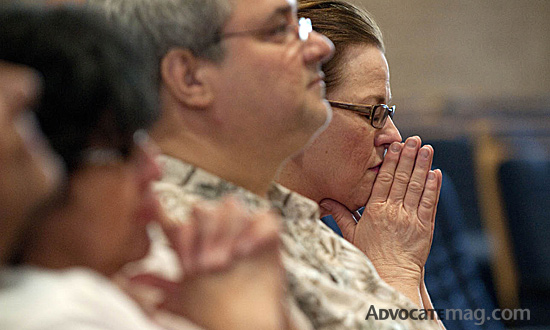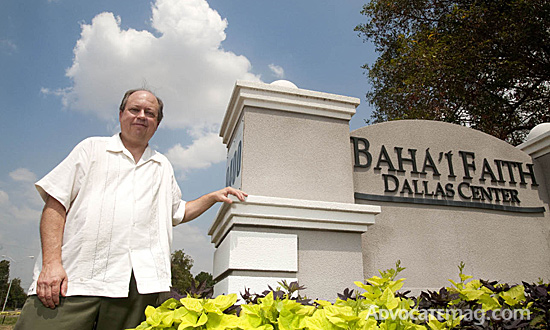
Harriet Gilman silently prays during a morning devotion time at the Bahai Center of Dallas. Photos by Jeffrey McWhorter
Mark Gilman was born in Istanbul. His father, who was in the U.S. Army, often was assigned to embassy duty, so Gilman lived in several different places, including Cairo, Egypt; Copenhapen, Denmark; and Taipei, Taiwan; as well as different parts of the United States.
“That experience exposed me to people of lots of different backgrounds,” Gilman says.
During his late teenage years, Gilman says he began to understand that the human race was “one family.”

Mark Gilman is the secretary of the assembly of the Baha’i Faith of Dallas. Photos by Jeffrey McWhorter
“It just seemed intuitive to me,” he says. “I can remember even in first grade [when] integration of schools happened on the army bases. I had African American friends. I had Asian friends. I had friends of Hispanic descent, and so forth.”
Though he was raised a Baptist, these diverse experiences led Gilman to embrace the Bahá’í faith.
“I just felt that if there was a God — and I felt that there was, who created all of us — he wasn’t playing Three-card Monte with the truth,” Gilman says. “It seemed to me that either no religion was true, or all of them were true and all of them reflected an authentic revelation from God.”
Gilman currently is the secretary of the spiritual assembly of the Bahá’ís of Dallas. In summer 2007, the Bahá’ís of Dallas moved into a former Lake Highlands church on Plano between Wanut Hill and Northwest Highway. They bought the building from the Church of South India, which had purchased it from Northminster Presbyterian. In 1997, Northminister and two other Presbyterian churches in Dallas came together to create the Lake Highlands Presbyterian Church located on Audelia and Northwest Highway.
Gilman says the Bahá’í community had outgrown its small facility on Northwest Highway near Inwood.
“We were looking for a larger property that was priced well. This property met all of the criteria that we were looking for,” Gilman says.
Gilman says the building was a “fixer upper” with a lot of problems when the community first moved in. Though the building still requires some work, he says, it seems to be a good location for the community.
“It’s really sweet to have the creek right here and mature trees and all the great things about East Dallas,” he says.
The main reason the Bahá’ís of Dallas outgrew their former building was because of believers coming from Iran seeking religious asylum, Gilman says. Bahá’ís cannot attend university in Iran, he says, and are forbidden in several professions.
“They’ve even been imprisoned arbitrarily,” Gilman says. “Many of the Bahá’ís there have had their property and businesses seized and have been subject to intense pressure and harassment virtually since the origins of the Bahá’í faith in 1844.”
Gilman says that approximately 440 adult Bahá’í believers are in Dallas. On the global level, there are 5 million Bahá’ís. The predominance of Iranians makes the Bahá’ís of Dallas unique from most other Bahá’í communities around the country, Gilman says. The community also includes whites, Hispanics, Ethiopians and a family from the Congo.
“If you come to a Bahá’í gathering here, you’re likely to hear prayers in Arabic and Persian and Amharic, which is the Ethiopian language, and French and Spanish and in English,” he says.
Gilman says the Bahá’ís believe it is important to be involved in their surrounding neighborhoods, and the Bahá’í center is often rented out as a meeting space. Michael Thomas, president of the Highland Meadows Neighborhood Association, says his association has held a number of events at the Bahá’í center. Thomas says his neighborhood doesn’t have a singular meeting space, so the center has been a “great host” for Highland Meadows events.
“They always want to be a good partner to our neighborhood and work with us,” Thomas says.
Gilman says the community has a good relationship with its neighbors despite the fact that many Lake Highlands residents are Christians.
“We’ve just basically been greeted very warmly since we first acquired this property,” he says. “I love Lake Highlands. I love East Dallas.”
What do Bahá’ís believe?
The Bahá’ís believe in a loving creative God who is the power behind the creation, and that he is unknowable. Every 500 or 1,000 years, they believe he raises up a “divine educator.” Through this “unique soul,” they believe people can see all the attributes of God. Bahá’ís believe the prophet founders of the world’s great revealed religions — Jesus Christ, Buddha, Muhammad, and several others — are included among the unique souls. They believe the last one sent from God was Bahá’u’lláh, a Persian nobleman who lived in the mid-19th century and is the faith’s founder.
“We feel there’s one religion, not multiple religions — the ancient religion of God, eternal in the past, eternal in the future,” Mark Gilman says. “Each of these dispensations or revelations that we know as the world’s great revealed religious systems represent an unfolding chapter; each one’s like a chapter in a single book.” Visit bahaisofdallas.org for more information.





